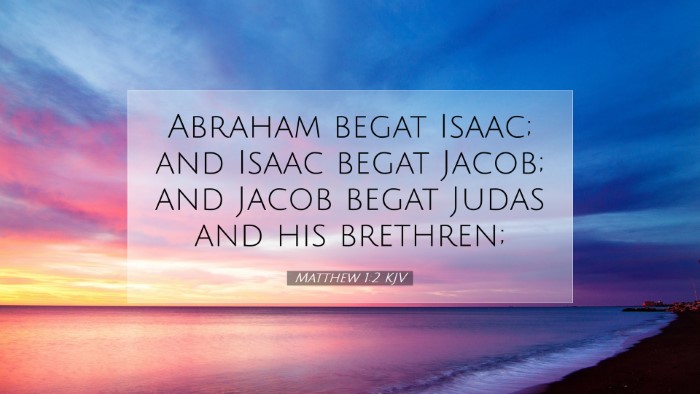Commentary on Matthew 1:2
“Abraham begat Isaac; and Isaac begat Jacob; and Jacob begat Judas and his brethren;” - Matthew 1:2
This verse marks a significant point in the genealogy of Jesus Christ, establishing His lineage through Abraham, the founding patriarch of Israel. The significance of this genealogy cannot be understated, as it serves as a fulfillment of the covenant God made with Abraham and highlights themes of promise, continuity, and faithfulness.
Importance of Genealogy in Scripture
Genealogy is an essential theme found throughout the Bible, notably in both the Old and New Testaments. In biblical tradition, a person's lineage and heritage play a critical role in their identity and their relationship with God.
- Matthew Henry emphasizes the importance of tracing Jesus’ genealogy back to Abraham, signifying a link to the Jewish people and their covenant with God. It asserts Jesus's Jewishness and fulfills the prophecies that the Messiah would come from Jewish descent.
- Albert Barnes notes that this genealogy fulfills the requirements of the Messiah being a descendant of David, as promised in the Old Testament. This not only affirms Jesus’s role as the awaited King of Israel but also has implications on the universal nature of His mission, intended for both Jews and Gentiles.
- Adam Clarke remarks that this genealogy signifies a divine orchestration in the unfolding of redemptive history, where God actively guides the lineage leading to Jesus, showcasing His sovereignty and faithfulness to His promises.
The Patriarchs: A Study of Abraham, Isaac, and Jacob
In Matthew 1:2, the genealogy opens with three significant patriarchs: Abraham, Isaac, and Jacob. Each of these men played a pivotal role in the establishment of the Israelite nation and the unfolding of God's plan.
- Abraham: Known as the father of faith, Abraham’s covenant with God laid the foundation for God’s chosen people. His willingness to trust God made him a model of faith, demonstrating that righteousness comes through faith.
- Isaac: The son of Abraham, Isaac represents the continuation of the covenant lineage. His life reflects themes of obedience, enduring trials, and living in the promise God made to his father.
- Jacob: Jacob, later named Israel, carries the legacy further, as he fathers the twelve tribes of Israel. His story is one of struggle, transformation, and ultimately, divine purpose.
The Significance of Judah and His Brethren
The verse continues with “and Jacob begat Judas and his brethren.” This mention of Judah is particularly noteworthy:
- Matthew Henry points out that Judah’s preeminence among Jacob's sons is significant, as it is through his lineage that kingship emerges. This foreshadows King David and ultimately Jesus, described as the Lion of the Tribe of Judah.
- Albert Barnes observes the implications of Judah’s name, which means “praise.” This indicates a deeper theological insight into the nature of worship, suggesting that from this line would come the ultimate source of salvation and praise for all nations.
- Adam Clarke connects the role of Judah to the fulfillment of God’s promise to bless all the families of the earth through him, highlighting God’s faithfulness and the unfolding of His plan through imperfect people.
Theological Reflections
This genealogy offers profound theological insights:
- Faithfulness of God: The meticulous recording of Jesus’s lineage reflects God’s unwavering faithfulness to His covenant promises. It assures believers that God fulfills His word across generations.
- Inclusivity of the Gospel: By beginning with Abraham, Matthew underscores that the redemptive work of Christ is meant for all mankind, as Abraham is recognized as the father of faith for both Jews and Gentiles.
- Human Imperfection and Divine Grace: The genealogies often include individuals with complicated histories, revealing that God uses flawed people to accomplish His perfect purposes. This reminds us of the depth of grace extended to humanity through Christ’s lineage.
Conclusion
Matthew 1:2 is a foundational verse that sets the stage for understanding Christ’s identity and mission. The lineage from Abraham to Judah serves as a powerful reminder of God’s faithfulness and the fulfillment of His promises through generations. For pastors, students, theologians, and Bible scholars, this passage invites deeper exploration into the nature of God's promise, the legacy of faith, and the anticipation of the Messiah.
As we reflect upon this genealogy, we are encouraged to recognize our own place within the narrative of God’s redemptive work and the call to share the Gospel’s inclusivity to all people.


